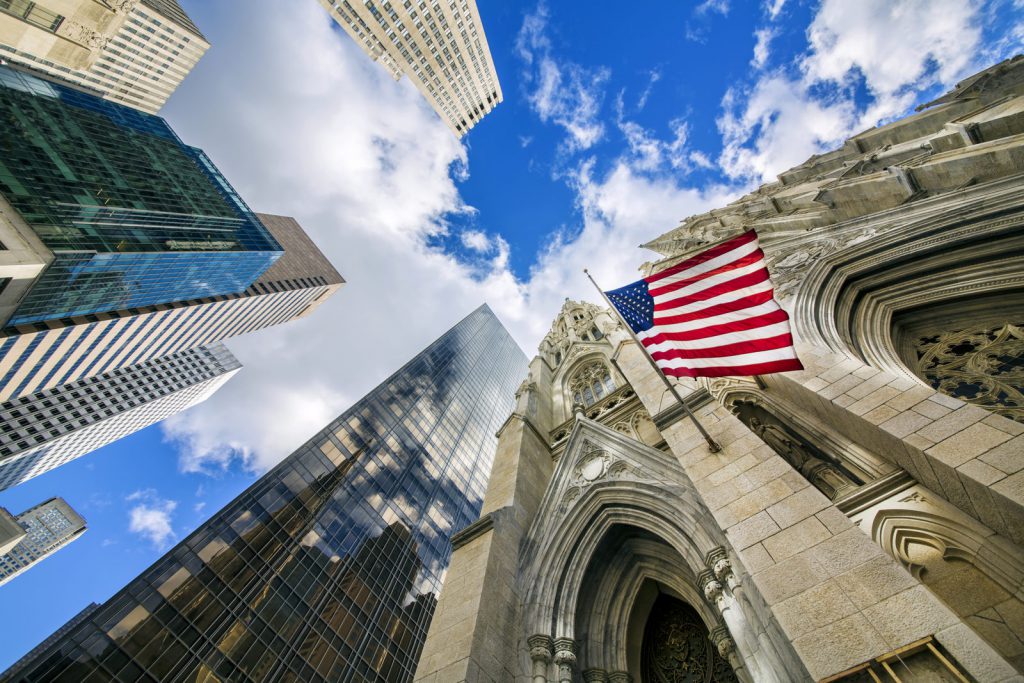
Published October 26, 2016
George Weigel's weekly column The Catholic Difference
Alfred Emmanuel Smith (1873-1944) served as Governor of New York for four terms and earned the gratitude of all civilized people by opposing Prohibition when that disastrous experiment in social engineering was, weirdly, at the center of our national politics. In 1928, Al Smith was the Democratic candidate for the presidency and took a bludgeoning from Herbert Hoover, as virulent anti-Catholicism helped to defeat the “Happy Warrior.” Shortly after his death, the Alfred E. Smith Memorial Foundation was created to support children in need. And this year, as in the past, the two major-party candidates for president were on the dais at the Al Smith Memorial Dinner, the Foundation’s principal fund-raiser, where they were to show, in the words of the invitation, “light humor and political savvy.”
No one doubts that raising funds for New York’s poorest children is a worthy cause, although the amount raised annually at the dinner is smaller than many would expect. Still, the question posed by the Al Smith Dinner, at least in recent decades, bears serious reflection: What is this white-tie extravaganza at the Waldorf Astoria saying about the Catholic Church in the United States, and particularly in America’s greatest city?
It’s hard to avoid the impression that the Al Smith Dinner has been, and still is, a public ritual of tribal Catholicism: We’re here; we’ve made it; see, we can deliver the two most important people in the country, a few weeks before the election. That statement of Catholic pride (which not infrequently risks lurching into hubris) may have had its place at a previous moment in U.S. Catholic history. But today it strikes me as moth-eaten, even somewhat sad.
It’s also rather out-of-touch with the grand strategy of twenty-first-century Catholicism, which is the New Evangelization—the intentional offer of friendship with Jesus Christ and incorporation into the company of his friends, the Church. By contrast, the Al Smith Dinner seems based on the premise that the old ethnic transmission-belt by which the faith was passed on to new American generations for centuries still works. But it doesn’t.
Then there’s the problem, every four years, of how to square the dinner’s proud, tribal Catholicism with the fact that one (or in 2016, both) of the principal guests advocate public policies that starkly contradict the Church’s settled moral teaching, based as it is on both reason and Revelation.
Hillary Clinton is the most perfervid, indeed fevered, supporter of the abortion license ever nominated for the presidency by a major political party—which means that she and the Church are at loggerheads on the most fundamental principle of Catholic social doctrine, the inalienable dignity of every human person at all stages of life and in all conditions of life. Her understandings of the nature of marriage and the dimensions of religious freedom are also in sharp contrast to those taught by the Catholic Church.
As for Donald Trump, his concept of the dignity of the human person seems to end at his own mouth, beyond which he spews venom at war heroes, Mexican-Americans, women who have displeased him, immigrants, political foes, and a variety of others he deems losers. His “I, alone” authoritarianism is just as serious a contradiction of Catholic social doctrine’s principle of subsidiarity as Mrs. Clinton’s Leviathan-state progressivism. And Trump’s record on right-to-life issues over the years has been, at best, extremely sketchy, and not infrequently off-side.
Yet there they were on October 20, sharing the dais at the Al Smith Dinner, as if their profound differences with the Catholic Church in matters of moral sensibility and moral judgment were small beer.
This is demeaning. And it’s a self-inflicted wound. In a city as awash in money as New York, there are any number of ways to raise needed funds for at-risk kids other than this charade of bonhomie, in which the candidates pretend to be witty by reading jokes written by others. Once, the Al Smith Dinner contributed to breaking down anti-Catholic prejudices. Now, its tribalism and its seeming indifference to grave moral issues are an impediment to the New Evangelization.
The Al Smith Dinner has become the Al Smith Embarrassment. It’s time to give thanks for what it once did—and then give it a decent burial.
George Weigel is Distinguished Senior Fellow of Washington, D.C.’s Ethics and Public Policy Center, where he holds the William E. Simon Chair in Catholic Studies.











